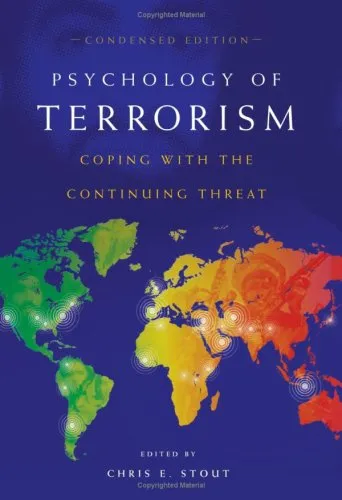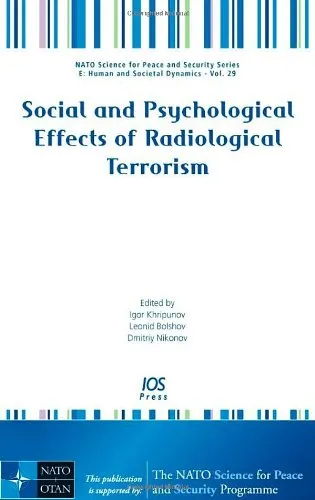Psychology of Terrorism, Condensed Edition: Coping with the Continuing Threat (Contemporary Psychology)
4.5
Reviews from our users

You Can Ask your questions from this book's AI after Login
Each download or ask from book AI costs 2 points. To earn more free points, please visit the Points Guide Page and complete some valuable actions.Related Refrences:
Introduction to the Book
Psychology of Terrorism, Condensed Edition: Coping with the Continuing Threat is a profound exploration of one of the most complex and deeply troubling issues of our time: terrorism. Authored by Chris E. Stout, this work offers a concise yet powerful examination of the psychological roots, mechanisms, and consequences of terrorism. It delves into the mindset of perpetrators, the impact on victims, and the ongoing challenge of mitigating fear while addressing the societal implications of these acts of violence. This condensed version has been restructured to be more accessible to diverse audiences, making it an essential read for psychologists, policymakers, security professionals, and any individual striving to understand and cope with the persistent threat terrorism poses to modern society.
Drawing from a wealth of interdisciplinary research, the book seeks to uncover the motivations, organizational structures, and psychological manipulation tactics employed by terrorist groups. Furthermore, it addresses the psychological toll terrorism exacts on individuals, communities, and institutions, navigating the complex interplay between fear, identity, and societal cohesion. This edition has been designed to summarize the critical findings and actionable insights of the original text without compromising its depth and intellectual rigor.
Detailed Summary of the Book
The book begins by defining terrorism and its various forms, emphasizing the psychological strategies utilized by terrorists to instill fear and disrupt societies. Stout then explores the profiles of terrorists, delving into their motivations, the allure of extremist ideologies, and the psychological manipulation techniques that fuel recruitment and radicalization. By dissecting the cognitive and emotional processes, the author sheds light on the mindset of both individuals and groups that engage in terrorism.
Apart from understanding the aggressors, Psychology of Terrorism profoundly examines the victims and society at large. It investigates the lasting trauma inflicted on individuals who directly experience terror attacks and the indirect psychological stress felt by organizations, communities, and nations. The societal ripple effects are discussed, such as how public fear and insecurity can lead to changes in behavior, policy, and social norms, often altering collective identity in the face of threat.
A crucial part of the book is its focus on coping mechanisms and prevention strategies. Stout outlines the steps individuals, communities, and governments can take to enhance resilience, reduce vulnerability to psychological manipulation, and mitigate the destructive effects of terrorism. He emphasizes the importance of mental health intervention, effective risk assessment, and cross-disciplinary collaboration to build a stronger, more adaptable society.
Key Takeaways
- The psychological foundations of terrorism are multifaceted, involving ideological, social, and personal factors.
- Terrorists use fear as a weapon, aiming to destabilize societies and erode trust in institutions.
- Understanding the psychological profiles of terrorists can aid in prevention and de-radicalization efforts.
- The effects of terrorism extend far beyond physical damage, creating profound emotional and psychological wounds in individuals and communities.
- Resilience, both at the individual and societal level, is key to mitigating the influence of terrorism and maintaining stability.
Famous Quotes from the Book
"The greatest weapon of a terrorist is not the bomb they plant, but the fear they sow in the minds of those who watch."
"Resilience is not the absence of fear; it is the mastery of it—an essential tool for coping with the ongoing threat of terrorism."
"Understanding the psychological mechanics behind terror is not an act of sympathy for the perpetrator, but a critical step toward prevention."
Why This Book Matters
In a world where terrorism remains an ever-present danger, Psychology of Terrorism equips readers with the tools to confront this evolving threat. By unraveling the motivations and methods used by terrorist groups, this book fosters a deeper understanding of one of humanity's gravest challenges. It encourages resilience, promotes informed decision-making, and provides actionable strategies for reducing both the occurrence and the psychological impact of terrorism.
This book also matters because it goes beyond theoretical exploration to offer practical insights that apply to national security, crisis intervention, and mental health care. With professionals in law enforcement, social work, and psychology facing increasing demands to navigate the fallout of terror incidents, Stout’s work serves as an essential resource for developing effective, empathetic, and strategic responses.
Ultimately, Psychology of Terrorism is more than a book—it is a guide to understanding, adapting, and persevering in the face of terror. As terrorism evolves, so must our understanding of it. Chris E. Stout’s insightful and accessible writing ensures that this adaptation becomes possible for readers from all walks of life.
Free Direct Download
You Can Download this book after Login
Accessing books through legal platforms and public libraries not only supports the rights of authors and publishers but also contributes to the sustainability of reading culture. Before downloading, please take a moment to consider these options.
Find this book on other platforms:
WorldCat helps you find books in libraries worldwide.
See ratings, reviews, and discussions on Goodreads.
Find and buy rare or used books on AbeBooks.



